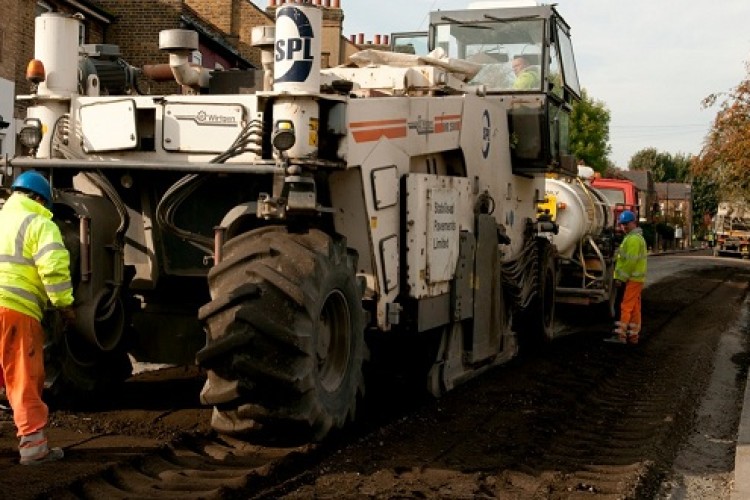The benefits are startling. Thanks to insitu recycling on roads maintenance projects across the borough, Enfield Council has saved £1.75m, cut an estimated 59t of carbon dioxide emissions, reduced traffic disruption, and eliminated the need for several weeks of work.
This has been achieved by the council’s decision to reuse the existing material on eight different road projects.
The decision to use the faster, more cost effective and environmentally beneficial in-situ road recycling method was strongly influenced by the Council’s discovery of hazardous tar-bound materials during testing of core samples taken from the eight damaged roads.
“We estimated there was approximately 2,500t of hazardous tar material in these roads, which would have had to be planed off and taken to a specially licensed tip about 90 miles away in Peterborough,” says Enfield Council's principal highways maintenance engineer Ian Sturrock.
“The cost of removing the tar-bound material, which has to be treated as hazardous waste, costs over £100/t and would have been around £250,000 in total. The main cost saving on these roads was achieved by not having to take the tar-bound planings to a licensed tip as hazardous waste.”
Enfield Council is believed to be the first local authority in London choosing to partially reconstruct hazardous tar-bound roads by in-situ recycling, instead of using conventional full depth pavement reconstruction techniques with new bituminous materials.
“Roads constructed in the UK prior to 1980, or surface dressed prior to the late 1980s may contain tar,” says Ian Sturrock. “Programmed maintenance works on these roads may, therefore, involve excavation of materials containing tar, and disposing of them to landfill is expensive and unsustainable.”
Cost considerations
According to the Council, the cost of traditional reconstruction of the eight tar bound Enfield roads would have been about £2.5M, and just over three and a half times the cost of £0.75M for the in-situ recycling process.
Treating the roads in-situ also took about a third of the time needed for traditional reconstruction, thereby also considerably minimising disruption to residents and local traffic, and saving extended road closure costs.

“In-situ recycling has shown to be less disruptive to local traffic than conventional reconstruction as we have saved about 300 movements of 20t wagons and improved our carbon footprint,” says Sturrock. “The advantage of recycling, compared to other methods, is that the work can be completed quickly with minimal disruption.
“Recycling the road is quicker, more cost effective and better for the environment than conventional replacement.”
The projects were carried out by specialist road recycling and stabilisation contractor Stabilised Pavements from Leicestershire.
The in-situ recycling process initially involved the top uncontaminated layer being planed off and disposed of as reusable road planings.
Then the underlying damaged sub-base layers of each of the roads were broken up and rotovated by a Wirtgen 2500 soil stabiliser to a depth of 200mm.
A layer of cement, blended with pulverised fuel ash, was spread over the surface of the rotovated material. The machine returned to rotovate and mix the cement and PFA blend into the material to full 200mm depth, while at the same time water was added into the mix to produce the required optimum moisture content.
Any excess material was taken off site and mixed with crushed concrete before being used in the Borough’s roads and footways as Type 1 sub-base. The in situ stabilised and strengthened material was then compacted with a roller, reprofiled and rolled again, prior to spraying the surface with a bonding tack coat and gritted so that the road could be temporarily opened to residential traffic.
The recycled road was subsequently paved with a new 50mm think surface layer and opened to full traffic.
The whole process was carried out in accordance with the Transport Research Laboratory TRL Report’s 386 & 611: Design guide and specification for structural maintenance of highway pavements by cold in-situ recycling.
Got a story? Email news@theconstructionindex.co.uk



